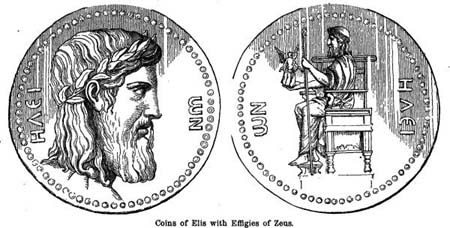





Frequently Asked Questions about the Ancient Olympic Games
- Where did the Olympic games come from?
- Why were they held at Olympia?
- Were there other contests like the Olympics?
- Who could compete in the Olympics?
- Were women allowed at the Olympics?
- How were the athletes trained?
- What prizes did Olympic victors get?
- Who were the Olympic judges?
- What was the penalty for cheating?
- Where did the marathon come from?
- When did the ancient games begin and when did they end?
When did the ancient games begin and when did they end?
Legends obscure the origins of the games, so placing any certain date on the start of the contest is impossible. Even our earliest sources hold the festival in the highest regard, suggesting the games were quite ancient. Pausanias says:
| Later on Iphitus, ... arranged the games at Olympia and reestablished afresh the Olympic festival and truce, after an interruption of uncertain length. ... At this time Greece was grievously worn by internal strife and plague, and it occurred to Iphitus to ask the god at Delphi for deliverance from these evils. The story goes that the Pythian priestess ordained that Iphitus himself and the Eleans must renew the Olympic games. (Pausanias 5.4.5-6) |
Most historians date Iphitos (Iphitus) to some time in the ninth century B.C.

Image from Harry Thurston Peck,
Harpers Dictionary of Classical Antiquities (1898)
The first recorded Olympic victor was Koroibos of Elis, traditionally dated to 776 B.C. Historical records and documents have preserved a long list of subsequent Olympic victors. Greek historians later used number of the Olympiad, the four year period between contests, as a means of dating events. If an event was said to have occurred in the first Olympiad, for example, it would be dated to the period of 776 to 772 B.C.

Photograph by Amy C. Smith
The games carried on, even as Greece's power declined Rome's rose. Although the Olympics continued to enjoy a measure of prestige, the varying political and economic changes of the Hellenistic and Roman periods affected both the site and the games. Some later Roman emperors, who admired Greek culture, revived the splendor of the games and restored the site and buildings.

Photograph by Amy C. Smith
By the 3rd century A.D., however, the lists of victors are increasingly uncertain and incomplete; by the end of the century the lists stop altogether. Once the Roman emperors formally adopted Christianity, they discouraged and eventually, outlawed, old "pagan" religious practices. Since the Olympic games were first and foremost a religious celebration in honor of Zeus, they held no place in the Christian empire. The emperor Theodosius I legally abolished the games in 393 or 394 A.D.
To read more about these topics, see Further Resources.
This exhibit is a subset of materials from the Perseus Project database and is copyrighted. Please send us your comments.